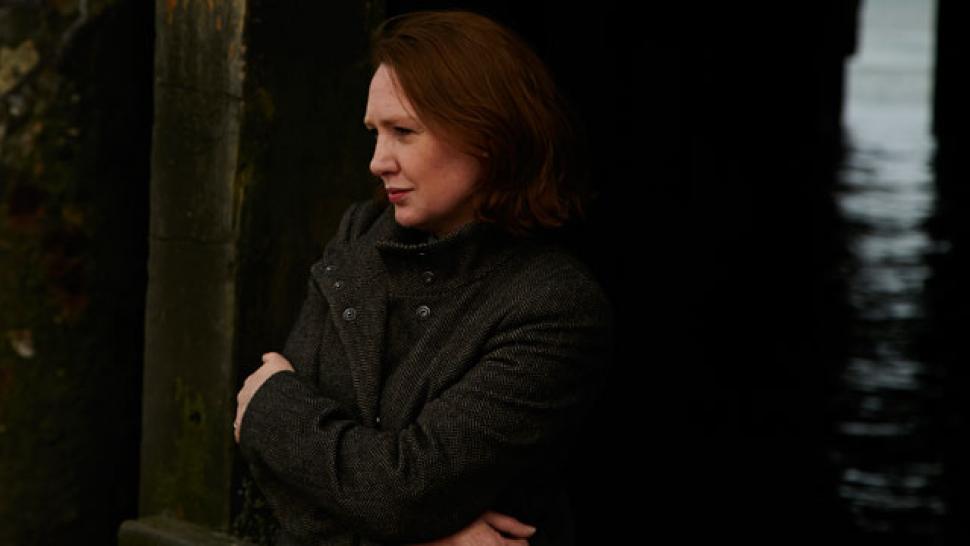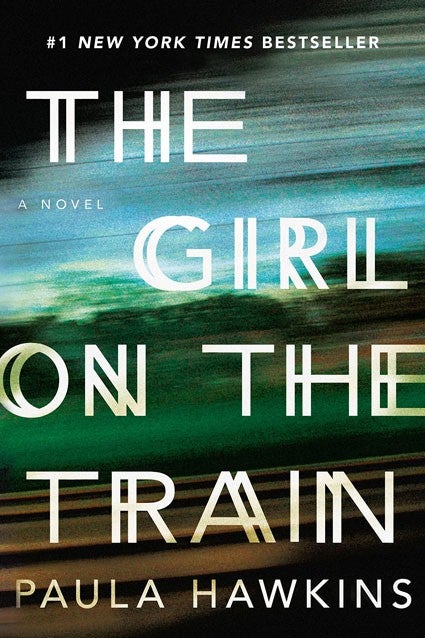Author Paula Hawkins Takes a Dark Turn: Read an Excerpt From 'The Girl on the Train'

The Girl on the Train was Paula Hawkins' last gamble at becoming a fiction writer after 15 years in journalism. The move proved to be a risk worth taking. Only four months after its release, the thriller has been sold in 25 territories and has been optioned by DreamWorks.
"I knew that the reviews were positive and that sort of thing, but no one expects to get to top the charts in multiple countries," Hawkins told ET in an interview in London.
The book seems to have stricken a chord through several basic elements common to human nature: curiosity, day dreaming and people watching.
Hawkins spins the daydreams of a commuter into a crime thriller when her lead character, Rachel Watson, becomes obsessed with a couple she frequently sees on the train. Without knowing anything about them, Rachel feels a connection with the couple through the "perfect" lives she's come up with for them in her head. When the wife of the couple goes missing, Rachel springs into action, getting herself intertwined with a mystery too much for her to handle.
Read the excerpt below to see why it's a part of the ET Summer Book Club.

FRIDAY, JULY 5, 2013
MORNING
There is a pile of clothing on the side of the train tracks. Light-blue cloth-a shirt, perhaps-jumbled up with something dirty white. It's probably rubbish, part of a load dumped illegally into the scrubby little wood up the bank. It could have been left behind by the engineers who work this part of the track, they're here often enough. Or it could be something else. My mother used to tell me that I had an overactive imagination; Tom said that, too. I can't help it, I catch sight of these discarded scraps, a dirty T-shirt or a lonesome shoe, and all I can think of is the other shoe and the feet that fitted into them.
The train jolts and scrapes and screeches back into motion, the little pile of clothes disappears from view and we trundle on towards London, moving at a brisk jogger's pace. Someone in the seat behind me gives a sigh of helpless irritation; the 8:04 slow train from Ashbury to Euston can test the patience of the most seasoned commuter. The journey is supposed to take fifty-four minutes, but it rarely does: this section of the track is ancient, decrepit, beset with signalling problems and never-ending engineering works.
The train crawls along; it judders past warehouses and water towers, bridges and sheds, past modest Victorian houses, their backs turned squarely to the track.
My head leaning against the carriage window, I watch these houses roll past me like a tracking shot in a film. I see them as others do not; even their owners probably don't see them from this perspective. Twice a day, I am offered a view into other lives, just for a moment. There's something comforting about the sight of strangers safe at home.
Someone's phone is ringing, an incongruously joyful and upbeat song. They're slow to answer, it jingles on and on around me. I can feel my fellow commuters shift in their seats, rustle their newspapers, tap at their computers. The train lurches and sways around the bend, slowing as it approaches a red signal. I try not to look up, I try to read the free newspaper I was handed on my way into the station, but the words blur in front of my eyes, nothing holds my interest. In my head I can still see that little pile of clothes lying at the edge of the track, abandoned.
EVENING
The premixed gin and tonic fizzes up over the lip of the can as I bring it to my mouth and sip. Tangy and cold, the taste of my first ever holiday with Tom, a fishing village on the Basque coast in 2 005. In the mornings we'd swim the half mile to the little island in the bay, make love on secret hidden beaches; in the afternoons we'd sit at a bar drinking strong, bitter gin and tonics, watching swarms of beach footballers playing chaotic twenty five -a side games on the low-tide sands.
I take another sip, and another; the can's already half empty, but it's OK, I have three more in the plastic bag at my feet. It's Friday, so I don't have to feel guilty about drinking on the train. TGIF. The fun starts here.
It's going to be a lovely weekend, that's what they're telling us. Beautiful sunshine, cloudless skies. In the old days we might have driven to Corly Wood with a picnic and the papers, spent all after- noon lying on a blanket in dappled sunlight, drinking wine. We might have barbecued out back with friends, or gone to the Rose and sat in the beer garden, faces flushing with sun and alcohol as the afternoon went on, weaving home, arm in arm, falling asleep on the sofa.
Beautiful sunshine, cloudless skies, no one to play with, nothing to do. Living like this, the way I'm living at the moment, is harder in the summer when there is so much daylight, so little cover of dark- ness, when everyone is out and about, being flagrantly, aggressively happy. It's exhausting, and it makes you feel bad if you're not joining in.
The weekend stretches out ahead of me, forty-eight empty hours to fill. I lift the can to my mouth again, but there's not a drop left.
Reprinted from The Girl on the Train by Paula Hawkins by arrangement with Published by arrangement with Riverhead Books, an imprint of Penguin Publishing Group, a division of Penguin Random House LLC., Copyright © 2015 by Paula Hawkins.